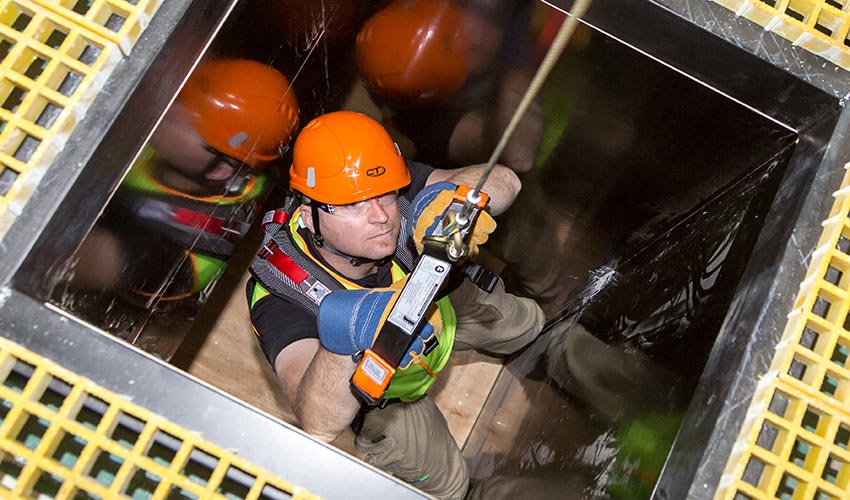Confined spaces are enclosed or partially enclosed areas not designed or intended for human occupancy. For this reason alone, working in confined spaces can pose severe risks to workers’ health and safety, which is why confined spaces training is crucial. So let’s explore why confined spaces training matters for employers and employees, focusing on the benefits of obtaining a confined space training certificate.
Understanding Confined Spaces
Confined spaces are zones with limited entry and exit points, often enclosed or partially enclosed, and crucial for various operations. These spaces include tanks, silos, tunnels, and storage bins. However, these spaces can pose significant risks to workers due to inadequate ventilation, potential gas accumulation, and restricted mobility.
According to Safe Work Australia’s Confined Spaces – Code of Practice (2020), the risks of working in confined spaces include loss of consciousness, impairment, injury or death from:
- The immediate effects of airborne contaminants
- Fire or explosion from the ignition of flammable contaminants
- Difficulty rescuing and treating an injured or unconscious person
- Oxygen deficiency or immersion in a free-flowing material, such as grain, sand fertiliser, water or other liquids
- Falls from a height
- Various environmental factors (e.g., extremes in temperature)
- Poor lighting, and
- Manual handling
To prevent these incidents and protect workers’ lives, all relevant staff must complete confined spaces training. In Victoria, the Occupational Health and Safety Regulations 2017 requires employers to ensure that all workers who enter or work in confined spaces have received adequate information, instruction, and training.
Confined Spaces Training
RIIWHS202E – Enter and work in confined spaces is a unit of competency covering the skills and knowledge required to work safely in confined spaces across the building, construction and resources industries. Key subject areas covered include:
- Identifying and assessing the hazards and risks associated with confined spaces
- Obtaining and following the required entry permit and instructions for performing work in confined spaces
- Interpreting and applying workplace procedures, tagging and lock-out procedures, and emergency procedures
- Selecting, wearing and caring for personal protective equipment (PPE) and other safety equipment
- Monitoring and maintaining safe environmental conditions inside the confined space
- Communicating effectively with other team members and supervisors
Participants who complete RIIWHS202E will be able to:
- Plan and prepare for entering and working in confined spaces
- Work in confined spaces
- Exit confined spaces
- Clean up after working in confined spaces
- Perform CPR as part of the emergency procedures
To complete this unit, you must complete at least two practical assessments of entering and working in confined spaces under the supervision of a qualified trainer. You must also complete a written evaluation that tests your knowledge of the theory and legislation related to confined space work.
The Benefits of a Confined Spaces Certificate
At MultiSkills Training, our one-day confined spaces training course covers all the topics mentioned above. Upon completing this unit, you will receive a nationally recognised statement of attainment that shows you have met the requirements of the RIIWHS202E – Enter and work in confined spaces unit. You will also receive a confined space training certificate that you can use to prove your competency.
The benefits of completing confined spaces training include:
- Risk Awareness: Confined spaces training enhances risk awareness, making workers mindful of potential dangers such as toxic gases and entrapment risks
- Emergency Preparedness: Trained workers are better prepared to handle emergencies like medical incidents or gas leaks, potentially saving lives
- Equipment Proficiency: Training ensures proper use of specialised equipment, reducing the risk of accidents caused by misuse
- Legal Compliance: Confined spaces training is often a legal requirement, ensuring employers adhere to safety regulations
- Team Collaboration: Effective teamwork is encouraged through training, enabling smoother operations in confined spaces
Note – A confined space training certificate is valid for three years from the issue date. After this period, you must refresh your skills and knowledge by undertaking a refresher course. Regular training ensures you are current with industry standards and best practices.
Enrol Today
For over 20 years, MultiSkills Training (RTO 40846) has been offering high-quality training courses across the building and construction industry. So if you are looking for a training provider in Victoria with industry-experienced facilitators who can professionally guide you through confined spaces training, look no further than MultiSkills Training.
If you’re interested in learning more about confined spaces training or any other 30-plus courses, contact our expert team via our contact page or call 1800 SKILLS.


